US$ 6 million grant to boost TB control in eastern European and central Asian countries

WHO/Franz Henriksen
Yesterday morning, a new US$6 million grant agreement was signed between the Global Fund and the Center for Health Policies and Studies (PAS Center), a nongovernmental organization based in the Republic of Moldova, as the principal recipient of a regional grant to boost tuberculosis (TB) control in the subregion. The grant agreement, supported by WHO/Europe, covers 11 eastern European and central Asian WHO Member States and the Global Fund. It starts in January 2016 and will run for 3 years.
It aims to develop:
- a flagship approach to TB control through building stronger systems for health
- up-to-date models for patient-centred TB care
- sustainable TB financing
- advocacy for best practice in the WHO European Region.
WHO European countries have demonstrated sustained commitment to the fight against TB; however, the Region has the world's highest burden of drug-resistant TB. A key concern is that fewer than 50% of such cases are detected and successfully treated, according to 2013 figures.
"This agreement aims to translate the best practices we have seen at country level and spread them across eastern Europe and central Asia," said Dr Mark Dybul, Executive Director of the Global Fund, at the signature ceremony.
The targeted countries are: Armenia, Azerbaijan, Belarus, Georgia, Kazakhstan, Kyrgyzstan, the Republic of Moldova, Tajikistan, Turkmenistan, Ukraine and Uzbekistan.
Through WHO/Europe's technical leadership, the grant will be implemented by different stakeholders, including the European Respiratory Society, the TB Europe Coalition and other academic and public health institutions across the Region.



